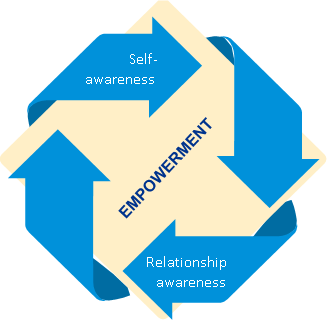 Research Paper By Anamaria Ciobanu
Research Paper By Anamaria Ciobanu
(Career Coach, ROMANIA)
Introduction
There are many studies regarding empowerment, its impact on organization’s success and how it relates to employees’ job satisfaction and their performance at work. A majority of them concluded that empowerment is crucial for the company’s effectiveness, increased pace of innovation, employees’ retention, job satisfaction and organizational commitment (to name a few: Conger & Kanungo (1988), Thomas & Velthouse (1990), Spreitzer (1995), Bass & Steidlemeier (1999); Bono & Judge (2003); Piccolo & Colquitt (2006))
Boudrias et al. (2014) underline in their study that psychological empowerment is an active motivational orientation related to an employee’s work role and feeling of being in control at work. Thus, psychologically empowered individuals view their work as having a meaning and impact, and therefore they work proactively and are more resilient in their efforts. Moreover, they exhibit higher self-determination which results in increased competencies and openness to innovation.
Given all these positive effects on organization effectiveness, one could expect that all companies are thriving to implement transformational leadership and the motivational mechanism of individuals’ psychological empowerment that comes along. However, there are many factors that could hinder this process of transformational leadership and empowering individuals. For example, a rigid and formally structure of the organization with centralized decision-making and authority is likely to constrain the motivational effects of transformational leaders as a result of lower individual expression within in a thigh role expectation (Shamir et al. (1993)).
In the context presented above, leadership coaches have an important role in fostering empowerment culture inside organizations which are in the process of implementing transformational leadership. This could be a very challenging mission for the coaches involved in this process.
According to the studies cited above, there are four perception associated to psychological empowerment: meaning (the extent to which personal values and beliefs fit the requirements of a job/ task (Hackman & Oldham (1980); Quinn & Spreitzer (1997))), competence (beliefs about the extent to which one possesses the skills/ proficiencies needed to be successful at work (Bandura (1989); Spreitzer (1995))), self-determination (the sense of autonomy and control over the initiation, regulation and continuance of work behaviors without feeling constant supervision (Deci, Connell & Ryan (1989))) and impact (the degree to which an individual believes it can influence the strategic direction, operational process and outcome of the company’s unit or as a whole (Ashforth (1989)).
Consequently, there are many positive behaviors that are activated together with psychological empowerment of the individuals: they will not wait passively for instructions and will actively change and affect their work environment resulting in a greater efficiency, they will be more committed and more loyal to the organization, they will show greater effort to deal with difficult situations and them will respond better in stressful situations, they will be more involved in delivering innovation and new services/products.
Therefore, from this stance of psychological empowering, coaches will have a crucial role in mapping the current situation within the organization, clarifying the gap between the current situation and the goal the organization and individuals have, identifying and committing to action clients (individuals or teams), choosing the actions to commit to, and partnering with the clients in order to enhance their accountability.
Coaching application – Ken Wilber’s model and EQ Model
Every level of interior consciousness is accompanied by a level of exterior physical complexity Wilber (2006).
Mapping the four dimensions of empowerment could be a challenging task. In this respect, Ken Wilber’s model could be used as a framework to base a coaching process on empowerment. The four quadrants of the model help the clients to integrate their perspective and awareness, to develop self-awareness, to understand themselves and the impact of their interaction with others in the external world, and the way they can manage themselves and their relationships at work or outside the workplace.
1st Quadrant of Wilber’s model is Intentional and is related to individual self and consciousness, self-esteem and self-assurance, individual’s values, vision, beliefs, limiting assumptions, internal drivers, norm/ moral, feelings/ emotions.
Example of powerful questions – What’s going on for you?:
2nd Quadrant is Behavioral and is linked to interpersonal skills (behaviour with another individual out in the world), competences, appearance, goals/ results, what the client say and do or don’t say and do.
Example of powerful questions – Where are you in relation to the other (actions and behaviour)?:
3rd Quadrant is Cultural and is related to the values, culture and beliefs of the team, organization, society, nation of which the individual is a part and helps the clients to gain awareness of their relationship with others, of the values and beliefs of the collectives they operate in.
Example of powerful questions – How would you describe the culture and values in your organization?:
4th Quadrant is Social and is represented by the systems, rules, regulations and procedures, best practices within the corporate environment/ society within the clients work.
Example of powerful questions – Where are you in relation to the system/world within you live and work?:
Another example of a coaching model that can be used to create awareness and action on empowerment is the EQ model developed by Daniel Goleman (1998).
According to the EQ model, as the clients develop self-awareness, they are paying more attention to what they say or do when engaging with others and could develop self-management. A step further, they gain understanding and awareness of the organization culture and values that result in a relationship awareness. Knowing how the system operates and teams cooperate with each other or not, how units, divisions, staff, customers and stakeholders interact with each other’s clients could increase their relationship management.
Empowerment could be the result of all these self- and relationship awareness and management.

Refection and Conclusions
Empowerment is about making a shift in individuals’ perspective.
The power is in you. The answer is in you. And you are the answer to all your searches: You are the goal. You are the answer. It’s never outside. Eckhart Tolle
Nevertheless, by referring to the old saying “one swallow does not a summer make, nor one fine day” one could argue that empowerment will have a real impact on individuals only if the shift in perspective is happening for many individuals at all the layers of the organization.
The empowering effects of transformational leaders and coaching process will differ across mechanistic vs. organic organizational contexts. Whereas mechanistic structures provide limited latitude of actions for leaders and employees (Shamir & Howell (1999)), the organic structures’ leaders have a high level of managerial discretion in their execution of transformational leadership behaviours (Fredrickson (1986)). Consequently, with no explicit behavioural expectation in place, organic structures allow employees to feel they can accept their leaders’ motivational influence.
As employees find meaning in their work and are aware of the impact of their work on others, they are more inclined to have a stronger self-management, with an increased sense of competence and self- determination. Therefore, one can argue that organically structured organizations provide the context that enhances the transformational leaders’ efforts together with the coaching process in place to psychologically empower their employees.
In any cases/ organizational structures, at the individual level, empowerment coaching will bring to the client self- and relationship awareness and management, and actions needed to align her/his intention and behaviour with her/his values and beliefs.
References:
Ashforth, B. E. (1989). The experience of powerlessness in organizations. Organizational Behavior and Human Decision Processes, 43, 207–242.
Bandura, A. (1989). Human agency in social cognitive theory. American Psychologist. September 1175-1184.
Bass, B. M., & Steidlmeier, P. (1999). Ethics, character, and authentic transformational leadership behaviour. Leadership Quarterly, 10, 181-217.
Bono, J. E., & Judge, T. A. (2003). Self-concordance at work: Toward understanding the motivational effects of transformational leaders. Academy of Management Journal, 46, 554-571.
Boudrias, J. S., Morin, A. J., & Lajoie, D. (2014). The directionality of the associations between psychological empowerment and behavioural involvement: A longitudinal autoregressive cross-lagged analysis. Journal of
Conger JA, Kanungo RN. (1988) The empowerment process: integrating theory and practice. Acad Manag Rev. 13(3):471–82.
Deci, E.L., Connell, J.P., & Ryan, R.M. (1989). Self-determination in a work organization. Journal of Applied Psychology, 74, 580-590. Goleman, D. (1998). Working with emotional intelligence, Bantam Books
Hackman, J. R., & Oldham, G. R. (1980). Work redesign. Reading, MA: Addison-Wesley. Occupational and Organizational Psychology, 87(3), 437–463
Piccolo, R. F., & Colquitt, J. A. (2006). Transformational leadership and job behaviours: The mediating role of core job characteristics. Academy of Management Journal, 49, 327– 340.
Quinn, R. E., & Spreitzer, G. M. (1997). The road to empowerment: seven questions every leader should consider. Organizational Dynamics, 26(2), 37–49.
Shamir, B., House, R. J., & Arthur, M. B. (1993). The motivational effects of charismatic leadership: A self-concept based theory. Organization Science, 4(4), 577–594.
Spreitzer, G.M. (1995). Psychological empowerment in the workplace: Dimensions, measurement, and validation. Academy of Management Journal, 38, 1442-1465.
Thomas, K.W.; Velthouse, B.A. (1990). Cognitive elements of empowerment: An “interpretive” model of intrinsic task motivation. Acad. Manag. Rev. 15, 666–681.
Wilber, K. (2006). Integral spirituality. Boston: Shambhala.